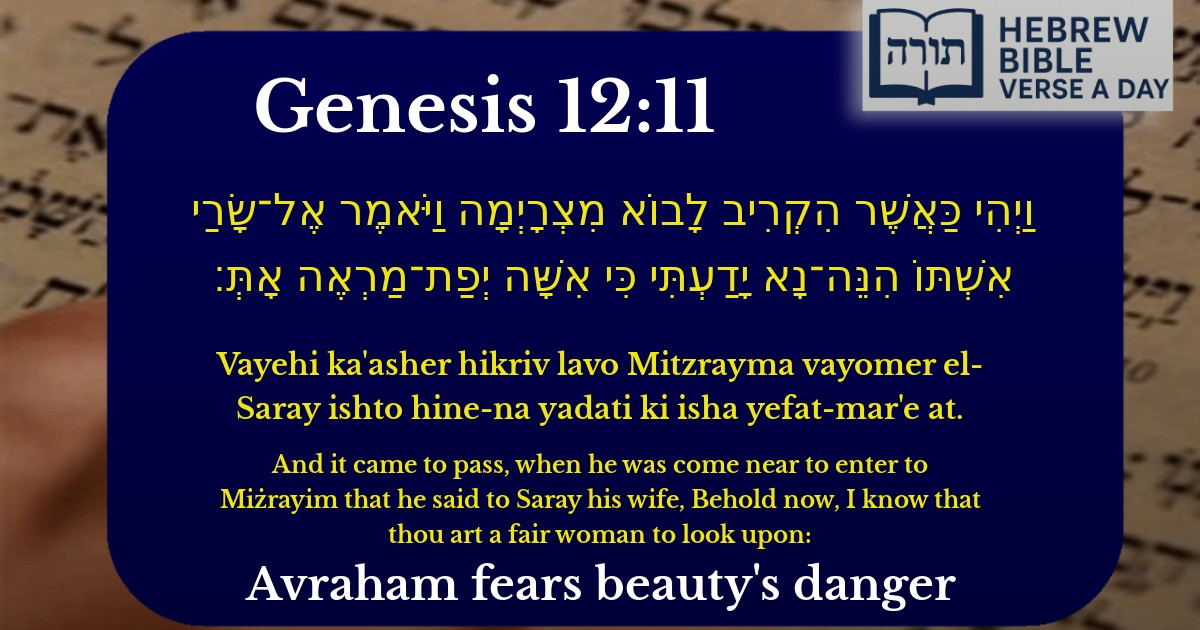Join Our Newsletter To Be Informed When New Videos Are Posted
Join the thousands of fellow Studends who rely on our videos to learn how to read the bible in Hebrew for free!
Hebrew Text
וַיְהִי כַּאֲשֶׁר הִקְרִיב לָבוֹא מִצְרָיְמָה וַיֹּאמֶר אֶל־שָׂרַי אִשְׁתּוֹ הִנֵּה־נָא יָדַעְתִּי כִּי אִשָּׁה יְפַת־מַרְאֶה אָתְּ׃
English Translation
And it came to pass, when he was come near to enter to Miżrayim that he said to Saray his wife, Behold now, I know that thou art a fair woman to look upon:
Transliteration
Vayehi ka'asher hikriv lavo Mitzrayma vayomer el-Saray ishto hine-na yadati ki isha yefat-mar'e at.
Hebrew Leining Text
וַיְהִ֕י כַּאֲשֶׁ֥ר הִקְרִ֖יב לָב֣וֹא מִצְרָ֑יְמָה וַיֹּ֙אמֶר֙ אֶל־שָׂרַ֣י אִשְׁתּ֔וֹ הִנֵּה־נָ֣א יָדַ֔עְתִּי כִּ֛י אִשָּׁ֥ה יְפַת־מַרְאֶ֖ה אָֽתְּ׃
וַיְהִ֕י כַּאֲשֶׁ֥ר הִקְרִ֖יב לָב֣וֹא מִצְרָ֑יְמָה וַיֹּ֙אמֶר֙ אֶל־שָׂרַ֣י אִשְׁתּ֔וֹ הִנֵּה־נָ֣א יָדַ֔עְתִּי כִּ֛י אִשָּׁ֥ה יְפַת־מַרְאֶ֖ה אָֽתְּ׃
🎵 Listen to leining
Parasha Commentary
📚 Talmud Citations
This verse is quoted in the Talmud.
📖 Bava Batra 16a
The verse is referenced in a discussion about Abraham's actions and his concern for Sarah's beauty, illustrating his awareness of potential dangers in Egypt.


Rashi's Explanation
Rashi (Bereshit 12:11) explains that Avraham had not previously noticed Sarai's beauty because of their modest way of life. Only as they approached Egypt, where people were less scrupulous about modesty, did he become aware of how others might perceive her beauty. The phrase "הִנֵּה־נָא יָדַעְתִּי" ("Behold now, I know") indicates a sudden realization due to changed circumstances.
Ibn Ezra's Perspective
Ibn Ezra (Bereshit 12:11) suggests that Avraham had always known of Sarai's beauty, but the phrase "יָדַעְתִּי" refers to his new understanding of the danger this posed in Egypt. The word "נָא" ("now") implies urgency in addressing this newfound concern as they entered a morally corrupt society.
Midrashic Interpretation
The Midrash (Bereshit Rabbah 40:4) offers several explanations:
Ramban's Insight
Ramban (Bereshit 12:11) notes that this verse demonstrates Avraham's prophetic concern. He foresaw that the Egyptians would covet Sarai and kill him to take her, leading to his plan to present her as his sister. The Torah records this to show Avraham's wisdom in dealing with potential danger.
Halachic Considerations
The Talmud (Sanhedrin 19b) discusses this incident in the context of pikuach nefesh (saving a life), justifying Avraham's decision to temporarily conceal their marital status. This establishes an important principle about prioritizing life preservation in halacha.